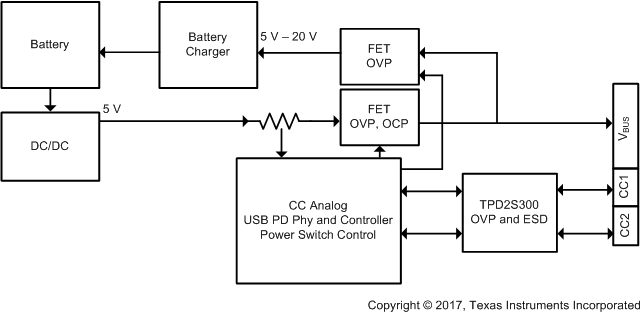SLVSDL1 April 2017 TPD2S300
PRODUCTION DATA.
- 1 Features
- 2 Applications
- 3 Description
- 4 Revision History
- 5 Pin Configuration and Functions
- 6 Specifications
-
7 Detailed Description
- 7.1 Overview
- 7.2 Functional Block Diagram
- 7.3
Feature Description
- 7.3.1 2-Channels of Short-to-VBUS Overvoltage Protection (CC1, CC2 Pins): 24-VDC Tolerant
- 7.3.2 2-Channels of IEC61000-4-2 ESD Protection (CC1, CC2 Pins)
- 7.3.3 Low Quiescent Current: 3.23 µA (Typical), VPWR, VM = 3.3 V
- 7.3.4 CC1, CC2 Overvoltage Protection FETs 200 mA Capable for Passing VCONN Power
- 7.3.5 CC Dead Battery Resistors Integrated for Handling Dead Battery Use Case in Mobile Devices
- 7.3.6 1.4-mm × 1.4-mm WCSP Package
- 7.4 Device Functional Modes
- 8 Application and Implementation
- 9 Power Supply Recommendations
- 10Layout
- 11Device and Documentation Support
- 12Mechanical, Packaging, and Orderable Information
Package Options
Mechanical Data (Package|Pins)
- YFF|9
Thermal pad, mechanical data (Package|Pins)
Orderable Information
1 Features
- 2 Channels of Short-to-VBUS Overvoltage Protection (CC1, CC2): 24-VDC Tolerant
- 2 Channels of IEC 61000-4-2 ESD Protection (CC1, CC2)
- Low quiescent current: 3.23 µA (Typical), VPWR, VM = 3.3 V
- CC1, CC2 Overvoltage Protection FETs 200 mA capable for passing VCONN power
- CC Dead Battery Resistors Integrated for handling dead battery use case in mobile devices
- 1.4-mm × 1.4-mm WCSP Package
2 Applications
- Smartphones
- Laptop PC
- Tablets
- Wall Adaptors
- Power Banks
- Power Drills
3 Description
The TPD2S300 is a single chip USB Type-C port protection solution that provides 20-V Short-to-VBUS overvoltage and IEC ESD protection for the CC1 and CC2 pins.
Since the release of the USB Type-C connector, many products and accessories for USB Type-C have been released which do not meet the USB Type-C specification. One example of this is USB Type-C Power Delivery adaptors that start out with 20 V on the VBUS line. Another concern for USB Type-C is that mechanical twisting and sliding of the connector could short pins due to the close proximity they have in this small connector. This can cause 20-V VBUS to be shorted to the CC pins. Also, due to the close proximity of the pins in the Type-C connector, there is a heightened concern that debris and moisture is going to cause the 20-V VBUS pin to be shorted to the CC pins.
These non-ideal equipments and mechanical events make it necessary for the CC pins to be 20-V tolerant, even though they only operate at 5 V or lower. The TPD2S300 enables the CC pins to be 20-V tolerant without interfering with normal operation by providing overvoltage protection on the CC pins. The device places high voltage FETs in series on the CC lines. When a voltage above the OVP threshold is detected on these lines, the high voltage switches are opened up, isolating the rest of the system from the high voltage condition present on the connector.
Finally, most systems require IEC61000-4-2 system level ESD protection for their external pins. The TPD2S300 integrates IEC 61000-4-2 ESD protection for the CC1 and CC2 pins, removing the need to place high voltage TVS diodes externally on the connector.
Device Information(1)
| PART NUMBER | PACKAGE | BODY SIZE (NOM) |
|---|---|---|
| TPD2S300 | WCSP (9) | 1.40 mm × 1.40 mm |
- For all available packages, see the orderable addendum at the end of the data sheet.
Application Diagram

4 Revision History
| DATE | REVISION | NOTES |
|---|---|---|
| April 2017 | * | Initial release. |